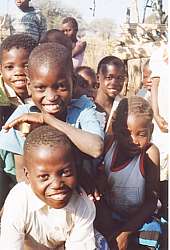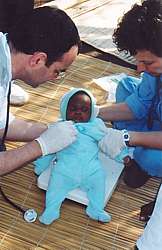|
 The
program of the Community of Sant'Egidio against AIDS in Mozambique
will foresee brief and middle term interventions, of prevention and
care. The first aim of brief term interventions is the prevention of
mother to child HIV transmission and transmission through blood
transfusions, as well as the creation of structural conditions
through which antiretroviral therapy can be introducted into the
country. The principal aim of middle term intervention is the
generalized introduction of antiretroviral therapy. The
program of the Community of Sant'Egidio against AIDS in Mozambique
will foresee brief and middle term interventions, of prevention and
care. The first aim of brief term interventions is the prevention of
mother to child HIV transmission and transmission through blood
transfusions, as well as the creation of structural conditions
through which antiretroviral therapy can be introducted into the
country. The principal aim of middle term intervention is the
generalized introduction of antiretroviral therapy.
program PLANNING
THE FIRST STAGE
of the intervention, realized with the contribution of the Italian
cooperation in November 2000, is setting the bases for the
realization of interventions of prevention and treatment of AIDS,
focusing the attention on the maternal-childish departments, on the
safety of blood and blood components, on biochemich and
microbiologic diagnosis, as well as on support therapy and treatment
of opportunistic infections.
The program is being developed in
three different areas of the country
- Maputo in the south, Sofala in the central region and Nampula in
the
north. It is centred upon the restoration of three maternity
and
childcare centres and three health centres for the prevention
and care
of sexually transmitted diseases. Such actions involve both
facilities
and basic supplies in order to reactivate centres which are
presently
unused or neglected. The objective is to improve the performance of
the
laboratories in these health centres.
We undertook structural rehabilitation
and logistical support in three
diagnostic laboratories and three transfusion centres of the
regional
hospitals. This rehabilitation of the various buildings and
other
logistical support was achieved during the first twelve months of
the
program.
As a result, since November 2001,
these regional hospitals
are equipped with advanced diagnostic laboratories to monitor
antiretroviral therapy. They are destined to receive patients
needing
more specific treatments.
From now on the health centres will work also as contact points with
the
patients to be treated with antiretroviral therapy.
 THE
SECOND STAGE � already approved by the Mozambican health
authorities - provides a further development of diagnostic
centres and infrastructures to allow access to antiretroviral
therapy. In the beginning, HIV diagnostic tests will be made
available to the whole population (particularly in transfusion
centres and for pregnant women). THE
SECOND STAGE � already approved by the Mozambican health
authorities - provides a further development of diagnostic
centres and infrastructures to allow access to antiretroviral
therapy. In the beginning, HIV diagnostic tests will be made
available to the whole population (particularly in transfusion
centres and for pregnant women).
Counselling activities will be provided.
The necessary control tests for patients involved in antiretroviral
therapy will be provided on a far-reaching basis. The goal is to
ensure antiretroviral treatment to as many people as possible and to
provide all the pregnant HIV positive women with the prophylaxis of
the mother-child transmission.
At the same time, the treatment of
opportunistic infections and sexually transmitted diseases will
be intensified, together with nutritional sustenance and health
education. Training activities for the paramedic and medical staff
focusing on the use of antiretroviral drugs will be carried out too.
The program provides also the
development of a support network for AIDS patients, based upon home
care and day hospitals. The program will have a central executive
seat in Maputo, where the epidemiological records, coming from the
different centres, will be monitored. This five-year plan will
afford information about the action's effectiveness, the
cost-benefit profile and the possibility of its
extension to all the centres in the country. The Mozambican centres
for fighting AIDS will ultimately become places where AIDS patients
will start to be treated according to the most advanced therapeutic
protocols.
|